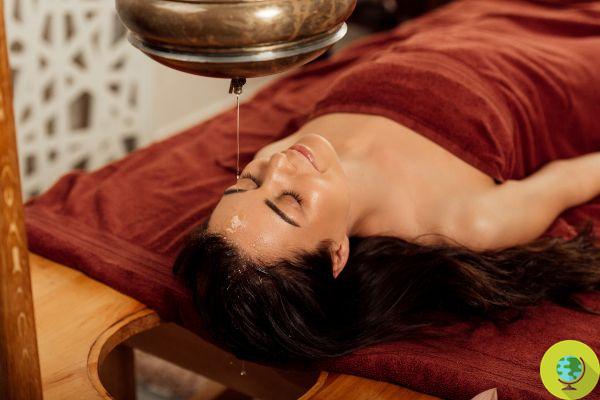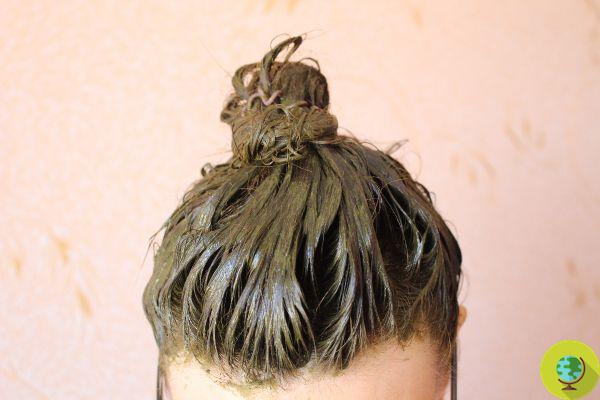How Ayurveda can help you have healthy and shiny hair every day with these herbal treatments and remedies
Many Indian mothers and grandmothers have always pampered their babies with oily head massages, herbal. A care and attention that favor a growth of healthy hair, shiny and thick.
This treatment is carried out by applying the so-called sudsy reetha, also known as soap nut, which should be applied to the scalp and then rinsed with scented water. These are practices that can be traced back to Hindu myths and religious texts, known as i See; in these texts the angry deities had unruly hair, while the patient and docile ones were represented with thick locks, curly or smooth braids.
In dreams it is not Ayurvedic practices that support them, are part of the traditional indian hair care; So why not apply these same DIY home remedies to promote hair growth and show off thick, shiny hair?
Index
L’Ayurveda
To achieve optimal hair growth with the Indian remedies, it is necessary to understand the basics of Ayurveda, that is an ancient practice based on the identification of the humors of the body, and their relationship with the natural elements: air, wind, earth, fire and ether.
THEAyurveda identifies three predominant doshas, or constitutions, known as vata, pitta and kapha; each has a combination of one, two or all three and each dosha affects the internal organs, as well as the physique, attributes and emotions.
Ayurvedic practitioners believe that dosha imbalance causes disease; these imbalances can affect various parts of the body, including hair and how it grows. (Read also: How Ayurveda helped this woman to cure hair loss)
How to treat the various types of hair

@Anastasia Kazakova / 123rf
Ayurveda teaches that a healthy body and mind will result in healthy hair and scalp, leading to optimal growth.
Vata hair
A vata person has a greater proportion of air and ether. Chances are she has naturally wavy hair and a rather dry scalp.
Hair is also likely to be porous; this means that they absorb products well, but also more dust, smoke and toxins in the air, and are prone to breakage and damage.
When the vata dosha is out of balance, an oily scalp can develop with itchy dandruff, and hair loss or slow growth.
Pitta hair
Pitta types have a higher proportion of fire and water, or fire and air. A person with a balanced pitta dosha will likely have naturally smooth and silky hair, moderately resistant to dyes and colors, because the hair follicle is dense. This means it is resistant to both locally applied nutrients and air pollution.
An imbalanced pitta dosha can cause dryness or greasiness on the scalp, depending on the proportions of air and water, and can also result in hair loss and slow growth.
Kapha hair
Kapha types have a higher percentage of land and water. A person with balanced kapha dosha will have naturally curly hair with a rough texture and a oily scalp.
The hair follicle is often very dense and does not easily absorb nutrients or dyes. When this dosha is out of balance, hair can become thin and brittle and can break easily.
Kapha types are less likely to suffer from hair loss, but at the same time they may grow very slowly. (Read also: What kind of body do you have? Ayurveda teaches to love ourselves as we are)
Basics of care Ayurvedic hair
Since each individual's doshas are slightly different, a hair growth regimen that works for one person may not work for someone else.
The following factors make up the Ayurvedic hair care:
- healthy mind and emotions
- optimal nutrition
- oil and wash your hair
- scalp massage
- herbal treatments
Create a custom routine for your particular hair type, it's the first step in encouraging hair growth.
(Read also: Hair detox: purify the scalp with these simple beauty rituals)
Mind and emotions
A fundamental principle ofAyurveda it is that all diseases originate in the mind; this means that physical imbalances usually start with imbalances in our emotions and in the mental state.
The mental-emotional state may have little to do with hair growth, but there are some scientific studies and research that support the opposite.
Uno study of 2020 showed that the hormones have a great influence on the hair; in fact, chronic stress, excessive exercise, smoking and drinking can lead to hair loss.
A 2019 study also indicated that i hair disorders they can have psychiatric and psychosocial aspects; therefore, taking care of your mental health is the first step to being healthy, even when it comes to hair growth.
Nutrition
In Ayurveda, following a good hair care regimen also includes eat well, providing nourishment to the hair follicles from within. This can help prevent hair loss and promote regrowth.
Best practices include:
- A diet rich in fruit and vegetables specific to the doshas
- A moderate amount of healthy fats, such as ghee or nuts
- Digestive aids such as cumin, turmeric, ginger and honey
- Herbal supplements
- Eat dosha-specific fruits and vegetables and available seasonally
This includes:
- heavy and nutritious foods for vata
- refreshing and calming foods for the pittas
- o astringent foods to be loved by kaphas
Foods that contain a balanced proportion of vitamins and minerals, as well as a good amount of protein, they are always the best. In addition, a moderate amount of clarified butter and nuts nourishes the body with healthy fats; fat can also result in shiny, well-nourished hair.
Adding small amounts of cumin, turmeric, ginger and honey helps digestive juices promote nutrient absorption.
Taking Triphala, like herbal supplement, in the morning is another Ayurvedic practice common to improve digestion and keep dosha imbalances in check. Triphala in Sanskrit means "three fruits", and refers to a combination of various medicinal herbs, such as Haritaki, Bibhitaki and amla / amalaki that work together to balance all doshas.
Hair oiling and washing
- hair oils they help nourish the hair follicles and scalp. Simply adding hair oil to your routine can encourage growth and deeply hydrate your hair.
The best oils are:
- almond oil or sesame for vata
- coconut oil or almond for pittas
- olive oil per kaphas
The advice is to grease the hair 2 times a week and then wash with shampoo; Furthermore, too frequent washing can deprive your hair of hers natural oils and discourage optimal growth. (Read also: 15 precious vegetable oils for health and beauty)
Scalp massage
Regardless of the dosha, Ayurveda recommends a head massage with warm oil followed by 20 minutes of rest before washing the hair.
Gentle scalp massages with herbal oil can do wonders for growth; Sometimes, the oils are heated and poured onto the scalp and forehead, then massaged. Another practice is to massage the neck and shoulders as well as the scalp.
Uno study 2016 showed that 4 minutes of scalp massage per day, for 24 weeks, increased hair growth in Japanese males.

@Lightfieldstudios/123rf
Herbal hair care
In Ayurveda, the fruits of the reetha (Sapindus mukorossi) and shikakai (Senegalia rugata) plants are added to hot water, and transformed into a foamy, soapy product similar to a shampoo. This mixture retains the moisture in the strand and the water is used to clean and nourish the hair.
In addition to cleaning the hair, i herbal remedies they can help improve their health; Plus, in addition to applying warm herbal oils, these can be included as part of:
- masks for scalp and hair
- cold and hot hair rinses
- hair wraps or soaking
For hair care, the dried powders, flowers, leaves and herbs preferred in Ayurveda are:
- rose petals
- green tea leaves
- neem
- tulsi, or holy basil
- amla
- henna
- ibisco
Rose petals
These have a softening effect, and are said to calm all doshas. It is best to add them to a warm bath or cold rinse, to retain the delicate aromatic oils; rose oil is an excellent ingredient for clay masks.
Green tea
This tea is astringent and can help decrease kapha dosha. Hot green tea is perfect to use as a rinse, for shiny, soft hair. You can also mix green tea powder with rose water to create one scented and stimulating scalp mask.
For information,
It is refreshing, antimicrobial, antibacterial and can help control dandruff. The fresh leaves of neem can be used to prepare a hair pack or to rinse them; while, the neem powder can be made into a paste with water, and used as hair and scalp mask.
Tulsi
Tulsi, or holybasil, is considered warming and helps promote hair growth. fresh leaves of tulsi they are ideal in a warm rinse, alone or mixed with green tea leaves.
Tulsi leaf powder is great paste for dry and irritated scalp, especially when mixed with aloe gel for a refreshing and easy to apply preparation.
Amla
Call also Indian gooseberry, amla is rich in vitamin C and is effective in remove dandruff. Add it to a hair rinse or mix it with tulsi leaves for an effective scalp mask.

@Anatolii Savitskii / 123rf
Henna leaves
These can be used to make a paste calming effect for irritated scalp. Most readily available in dried form, the henna paste enriched with aromatic, scented and calming oils, it has a soothing effect.
Hibiscus
This flower helps remove stagnation from the scalp, and it can promote growth. It can be used in dried or powdered form, and applied to the hair in a mask or as an ingredient for shampoo.
Aromatherapy
THEaromatherapy it has an impact on the psyche, to connect the individual on an emotional level, and is able to bring profound benefits and changes on an emotional, physical and spiritual level.
Below i calming and relaxing aromas:
- lavender essence
- sandal
- chamomile
- incense
- Cedar wood
- woody and earthy aromas
According to a 2021 review, the essential oil at ylang ylang and rosemary can stimulate hair follicles, but there is no evidence that aromatherapy has a direct effect on hair growth.
Masks for scalp and hair
A scalp mask or for the hair it can be used to treat undernourished areas, directly supplying nutrients where they are most needed.
Herbs can treat scalp problems, such as dryness and dandruff; while, a good mask also seals the nutrients in the strands.
The ingredients to use in the masks are:
- aloe for a dry and itchy scalp
- limone e neem for an oily scalp
- rose and sandalwood combined in light clay for an irritated scalp
- henna mixed with nutrient-rich oils to cool the scalp
If you want to try a hair or scalp mask, follow these steps:
- Wash your hair before applying the mask
- Make a paste with the desired dry ingredients and a suitable liquid, such as water or oil. The oil is best for dry hair and scalp
- Wash your hair with a light shampoo, and rinse before the mask has dried completely
- Avoid drying your hair after treatment for maximum benefit
Rinses and compresses
Rinses and wraps serve as the final step in hair care. A rinse consists of washing the hair with water, while a compress consists of soaking the hair in a tub.
Traditionally, herbs, such as neem or henna leaves, were added directly into buckets of hot water or mixed in bath water to create rinses.
Le fragrant floral additions they are often used in cold water baths; here are the most used:
- rose petals
- jasmine buds
- honeysuckle
- ibisco
These ingredients can soothe irritated skin, including the scalp, and leave a sweet and pleasant scent.
As mentioned above, i hair problems they can be best treated by addressing dosha imbalance first, through mental health and balanced diet. While not a quick fix, the wisdom of Ayurveda focuses on holistic solutionsrather than remedies that only target symptoms.
Could it be interesting for you:
- What happens if we add some sugar to our shampoo?
- Strengthening the hair: foods and natural remedies
- Fermented rice water, use it like this on curly hair to always have it silky and shiny
- Flax seeds: how to use them for hair health and beauty
- Rice cooking or rinsing water: you'll never throw it away again after discovering these ways to reuse it


























